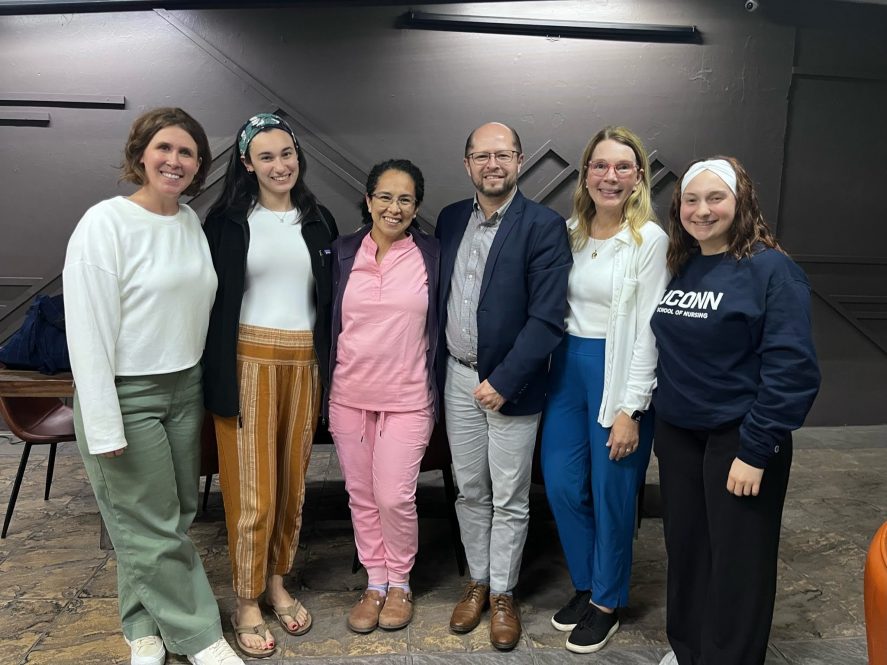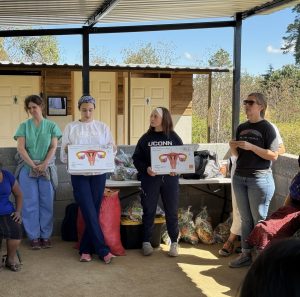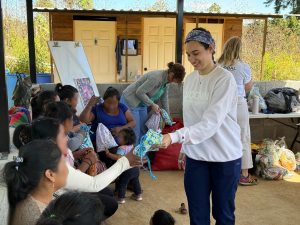UConn Nursing's scholarly project in Guatemala brings conversation to the community regarding women's health

UConn Nursing faculty, students' and Guatemala community doctors educate on women's health.
In Guatemala, stigma and misinformation can leave women without the proper knowledge or care they need surrounding reproductive health. Cultural taboos surrounding menstruation and menopause create barriers, leading to confusion, shame, and possible health risks.
A woman from the community shared that "we don't talk about it in the community, we don't really talk about it much in our family and we don't really talk about it at school."

This year, Michelle Cole, DNP, MSN, RN, CPN and Carrie Eaton, Ph.D., RNC-OB, C-EFM, CHSE had the unique opportunity to conduct a quality improvement project in the Greater Panchoy Valley surrounding the colonial city of La Antigua, a UNESCO World Heritage Site.
Cole is an associate clinical professor and director of global initiatives at UConn's School of Nursing. Her research centers on nursing education, global nursing, pediatric care, and children's health needs. Eaton is also an associate clinical professor at UConn. Her own scholarship interests lie within maternal mental health, obstetric emergencies, and nursing simulation.
Their complementary interests provided a medium through which health disparities in Guatemala could be effectively addressed. Professor Cole and Eaton's collaboration focused on breaking down certain barriers and promoting conversation about reproductive health.
The weeklong scholarly project was possible due to UConn's Dean's Award for Pilot Research, Innovation, and Scholarship Projects. This seed grant was created to support faculty in developing and implementing innovative research and scholarship initiative, with a focus on projects with potential for significant impact.
As the grant was written, Cole's intention was to mentor others. As a faculty member, her focus goes beyond just scholarship - she strives to foster continuous improvement and demonstrate the impact such projects can have. Thus, two students were able to join the expedition.
"Dr. Cole has been working with these communities for many years, and it's truly inspiring to see the strong bonds she has built," Willett explains. "Nurses have a unique ability to connect with people in many different circumstances through the mutual understanding and value of human connection and understanding. The dedication she has put into this work is incredibly meaningful and beautiful."

Senior nursing students Emily Brochu and Junior Madeleine Willet participated to gain valuable experience in quality improvement initiatives. Eaton shared "I cannot fathom more mature, responsive and capable students. They were both so invested in the work and education."
The group assembled food bags as an incentive for women in the community to participate in the focus groups. Cole led these focus groups to provide education on menstrual health and distributed reusable menstrual products.
"Nurses have a unique ability to connect with people in many different circumstances through the mutual understanding and value of human connection and understanding. The dedication she has put into this work is incredibly meaningful and beautiful." – Madeleine Willet
The work done in these communities is based upon trust that Cole has built through years of work. Additionally, translators were there to provide important cultural context. The older women who participated were interested in topics that were impacting them, such as menopause. It was important to them to teach the younger women and girls in the community.
"I think it really highlights the power of human connection and how the firsthand stories and experiences people share shape our perspectives, communication, and relationships. It also helps put into perspective how valuable love and compassion is," Willett adds.
By sharing their experiences in quality improvement, such as educating women in rural Guatemala about menstrual health and distributing reusable menstrual products, nurse faculty help foster students' professional development and appreciation for the importance of quality improvement. This initiative had numerous positive outcomes, ultimately empowering women in Guatemala with the knowledge and resources to improve their health. Cole and Eaton are currently analyzing the qualitative data collected from focus groups and plan to share their findings with a broader audience.
"It is both an honor and a privilege, as a nurse and as a woman, to work alongside the remarkable women of Guatemala," shares Cole. "I am grateful for the opportunity to learn from them and share knowledge on our journey toward empowerment and better health. I also want to express my sincere appreciation to the School of Nursing for their support in making this project a reality."






